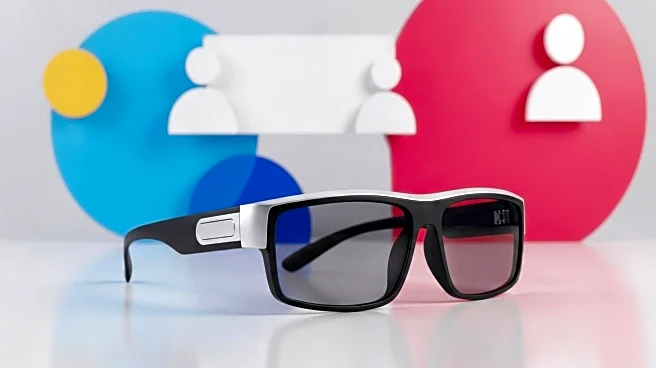What's Happening?
Meta CEO Mark Zuckerberg has made a bold claim regarding the future of smart glasses, suggesting that individuals who do not wear AI-enabled smart spectacles may face a 'cognitive disadvantage.' During Meta's Connect developer conference, a product demo of the new smart glasses was presented, but it encountered several technical issues. The demonstration involved a chef using the glasses' voice assistant, which inadvertently activated all glasses in the room, causing a disruption. Meta CTO Andrew Bosworth explained that the issue was due to multiple instances of Meta's AI running simultaneously, leading to a self-inflicted DDOS. Despite the promise of enhanced cognitive capabilities, the demo revealed significant challenges in real-world application, including frequent misunderstandings by the AI assistant.
Why It's Important?
The development of smart glasses by Meta represents a significant advancement in wearable technology, potentially transforming how individuals access information and interact with digital platforms. However, the technical difficulties experienced during the demo highlight the gap between the envisioned capabilities and current technological limitations. This raises questions about the practicality and social implications of widespread adoption. While smart glasses could offer cognitive benefits, they may also introduce social awkwardness and reliance on technology, affecting interpersonal interactions and societal norms. Stakeholders in the tech industry, including developers and consumers, must consider these factors as they navigate the future of wearable technology.
What's Next?
Meta is likely to continue refining its smart glasses technology to address the issues highlighted during the Connect conference. Future updates may focus on improving AI responsiveness and reducing technical glitches to enhance user experience. As the technology evolves, Meta may also explore strategies to mitigate social disadvantages associated with wearing smart glasses. The company may engage with developers and users to gather feedback and implement changes that align with consumer expectations. Additionally, Meta's competitors in the tech industry may respond by advancing their own wearable technologies, potentially leading to increased innovation and competition in the market.
Beyond the Headlines
The introduction of smart glasses by Meta could have broader implications for privacy and data security. As these devices become more integrated into daily life, concerns about data collection and surveillance may arise. Ethical considerations regarding the balance between technological advancement and personal privacy will likely become more prominent. Furthermore, the cultural impact of smart glasses on communication and social behavior warrants examination, as society adapts to new norms influenced by wearable technology.









